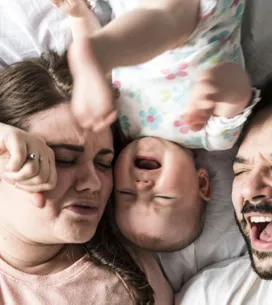At what age can children understand death?
Death is a concept that very young children can understand, especially physically: a young child will feel the physical loss of a person, face and voice to a greater extent the younger he or she is.
Loss isn't 'physically' stamped in their memory, but sensed by the body as a deep loss. If a baby loses its mother, years later he or she may still be able to remember her scent or the way she carried him, without really being able to identify her.
At the age of 3 or 4, children start to familiarise themselves with loss, through the loss of objects, or when their parents leave them at the crèche or playschool in the morning. Loss is first experienced as a notion of abandon. Later on, death and mourning will be explained, and will make a child aware of the realities of death. The most common of these losses is learning that Father Christmas doesn't exist.
How should you answer your child's questions about death?
"Mummy, what's death?" This agonising question soon comes up in conversation between parents and children. It's an existential question of the highest importance to a child and you needn't wait for a dramatic event to talk to your children about death. Image-laden phrases like "Nana's gone up to join Grandad in heaven" or "He's gone on a journey" can be a solution at first, but they have their limits and can confuse children. The best thing to do is approach death simpy and honestly, without any big speeches.
It's useless to tell a child that a loved one is away and will be coming back: simply explain that the deceased is not coming back. This may be hard for them to take, but it will help your child accept it more easily. By all means tell your child that you don't know what happens after death, or that the dead person goes to heaven, depending on your beliefs. This dialogue between you will help your child start to reflect on such matters.
How do you tell a child someone has died?
If someone close to your children dies, it's wise to broach the subject as soon as you can (if it was expected, you can also prepare them beforehand).
It's important to tell children quickly rather than waiting until they ask why they haven't seen the deceased for a while. Gently tell them that the person who has died has gone up to heaven and won't be coming back. If you're in a lot of grief yourself, simply tell your children you're very upset and you'll talk to them about it more later. Don't lie: you'll only confuse and upset them. Children are well able to understand your grief and can even help console you. Explain that even if the dead person isn't there any more, he or she will remain in their hearts for always. A photo on the wall, a written tribute or letter can temporarily help to ease their pain.
Should children attend funerals?
Many psychologists recommend taking your children to funerals because the ceremony can help them understand what has happened and receive support from their family in the form of comforting words, gestures and readings that will help them remember the deceased. Children should be able to observe and grieve, build memeories of the loved one and cry freely. This is the best way to say goodbye to a loved one. If children want to, they can view the body and place a drawing or special object in the coffin.
How do you help children overcome the death of a loved one?
Sometimes children develop feelings of guilt and feel responsible for the death. Children may remember thinking bad thoughts or wanting the person dead if they were angry with them, or they could feel responsible for not having loved the person enough. Explain that this isn't true, because thoughts can't kill, and sometimes everyone thinks bad thoughts.
Some children revert back to acting like babies, demanding more cuddles and attention. This is a sign that a child is not coping well with the death and is struggling to grieve. If this happens, let them come to you when they want to and show you're always there for them. Don't leave them alone with their grief and try and spend more time with them relaxing, cuddling or taking them out. And if your child wants to visit the grave, regular visits can actually be a great comfort.
If your child is in great distress, get professional help
In some extreme cases, children can become agressive, reject company, experience sleeping problems or complete indifference. If this attitude continues, your child needs help to overcome the mental block preventing him or her from expressing the normal emotions associated with grief. A psychotherapist will be able to help.













